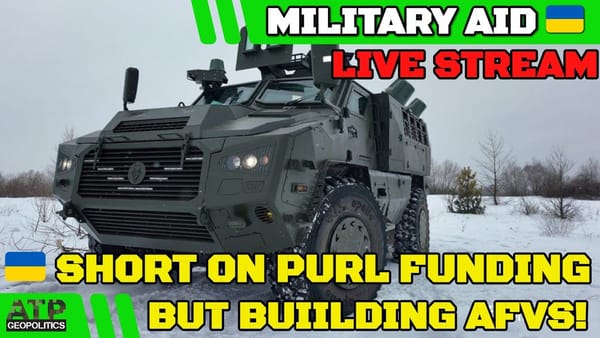Ukraine War Update NEWS: Military Aid News
Table of Contents 📖
"The Russians might be firing 10 to 1, but if the Ukrainians can hit with one shell where the Russians would take 10, then that actually kind of equalizes things to some degree."
Hello Team
🎦 00:00-00:15⏩
Jonathan welcomes viewers to the second part of the Ukraine War News Update for 15th March 2024, focusing on military aid and equipment. He briefly mentions a double-tap missile strike in Odesa and a drone attack in Tula, Russia, before moving to the main topic of military aid.
Return to top⤴️
Germany's Military Aid and Industrial Support for Ukraine
🎦 01:10-07:09⏩
- German arms manufacturer Rheinmetall plans to build at least four arms factories in Ukraine to produce ammunition, military equipment, gunpowder, and air defence systems.
- Rheinmetall also aims to increase its artillery ammunition production to 1.1 million shells per year by 2027, with new plants in Germany, Ukraine, and Lithuania.
- Germany will likely award Rheinmetall a new framework contract for up to 2.2 million artillery shells over 10 years, some of which will go to Ukraine.
- Germany has delivered demining equipment to Ukraine.
- The Bundestag rejected supplying Taurus cruise missiles to Ukraine. Jonathan suggests this is political, as a majority voted against the proposal by the opposition CDU-CSU, echoing Chancellor Scholz's stance.
- Jonathan discusses a leaked debate about the processing power needed for Taurus missiles, citing Fabian Hoffmann's analysis. He explains the simple and extended mission planning protocols for Taurus missiles, highlighting the trade-off between ease of planning and vulnerability to countermeasures.
- He argues that Ukraine is capable of handling the extended mission planning and data processing, even with reachback support, as the UK does with Storm Shadow missiles.
- Jonathan believes the key obstacle is the lack of political will within the ruling SPD, suggesting they used a secret meeting with high-ranking officers to influence uninformed MPs and further Scholz's agenda.
International Contributions to Ukrainian Artillery Ammunition Supply
🎦 07:09-08:14⏩
- Portugal joined the Czech-led shell procurement mission for Ukraine, pledging €100 million ($108 million), potentially pushing the total to over a million shells.
- Sweden also joined the initiative, allocating €30 million for ammunition.
- Jonathan believes this signifies a positive outlook for Ukraine's artillery ammunition supply in the near future.
France Considers Sending Troops to Ukraine
🎦 08:14-11:53⏩
- Le Monde reports that France has been considering sending troops to Ukraine since June 2023. Jonathan cites Macron's statement about sending personnel to Odesa.
- While acknowledging the possibility of better intelligence briefings, Jonathan speculates that coups in former French colonial territories in the Sahel region, potentially fuelled by Russian influence, might be motivating Macron's stance. He suggests Russia might be exploiting anti-colonial sentiments to gain access to raw materials and replace French influence.
France and Germany to Establish Ammunition Production in Ukraine
🎦 11:53-17:57⏩
- France and Germany will set up production lines for shells and missiles in Ukraine.
- Jonathan discusses France's approach to artillery, emphasizing quality over quantity, with a focus on accuracy and range.
- He quotes French Defence Minister Sébastien Lecornu, who highlights the trade-offs between production time, cost, and shell performance. Lecornu emphasizes that French shells, while more expensive, have greater range and accuracy.
- Lecornu acknowledges the limitations of EU health and safety regulations, which impact production capacity but ensure higher quality.
- Jonathan notes that France produced 30,000 155mm artillery shells in 2023, with plans to increase to 48,000 in 2024 and 60,000 in 2025, excluding production in Italy and Belgium.
- Jonathan discusses the use of AI by German startup Helsing AI to improve the Caesar howitzer's accuracy, aiming to reduce ammunition consumption by achieving target hits with fewer shells.
- He cites a Ukrainian soldier who highlights the need for longer-range ammunition (10-12km) and F-16s for air cover to counter Russian kamikaze drones.
- Jonathan acknowledges criticisms of France's relatively low shell production but emphasizes the complexity and time required to scale up manufacturing, especially for high-tech precision equipment.
- He notes the importance of local production in Ukraine to expedite the process.
- Jonathan mentions French humanitarian and medical aid deliveries to Ukraine.
South Korean and Japanese Military Support for Ukraine
🎦 17:57-19:45⏩
- Ukraine has received South Korean 155mm ammunition.
- Jonathan reports on the McAllister Army Ammunition Plant in Oklahoma refurbishing South Korean 155mm shells and sending them to Ukraine.
- He welcomes South Korea's involvement, particularly in light of North Korea's support for Russia.
- Japan officially agreed to cooperate with the US in supporting Ukraine with weapons, a significant shift in its military strategy.
- The US plans to purchase Japanese weapons produced domestically under an American license for transfer to Ukraine.
Updates on Military Aid from Bulgaria and the US
🎦 19:45-22:30⏩
- Bulgaria confirmed the delivery of at least 100 armoured personnel carriers to Ukraine by rail, with transportation costs potentially covered by Romania.
- US House Speaker Mike Johnson informed Republican senators about a forthcoming Ukraine aid bill, which will differ significantly from the Senate's $95 billion bipartisan aid package.
- Jonathan expresses uncertainty about the details of Johnson's plan, comparing it to a previous report from The Hill and acknowledging skepticism from viewers who distrust Johnson's commitment to supporting Ukraine.
- He speculates that the new bill might be separate from appropriations and potentially include lend-lease agreements and loans.
- Jonathan acknowledges concerns about potential delays but emphasizes that even a less comprehensive bill is preferable to no aid.
Ukrainian Mine-Laying Drone and Russian Equipment Storage at Zaporizhzhia Nuclear Power Plant
🎦 22:30-24:38⏩
- Jonathan reports on the testing of a Ukrainian mine-laying drone equipped with 15 TM-62 anti-tank mines. He notes the drone's large payload capacity and its ability to navigate uneven terrain.
- He discusses evidence confirming Russia storing a significant amount of military equipment inside the Zaporizhzhia nuclear power plant, exploiting the site's protected status.
- Jonathan grapples with the ethical implications, acknowledging the strategic advantage while drawing parallels to the taboo of using hospitals for military purposes.
- He questions the international legal framework surrounding such actions and invites viewers to share their perspectives.
Wrap up
🎦 24:38-24:57⏩
Jonathan thanks viewers for watching and encourages them to like, subscribe, and share the video.
Return to top⤴️




